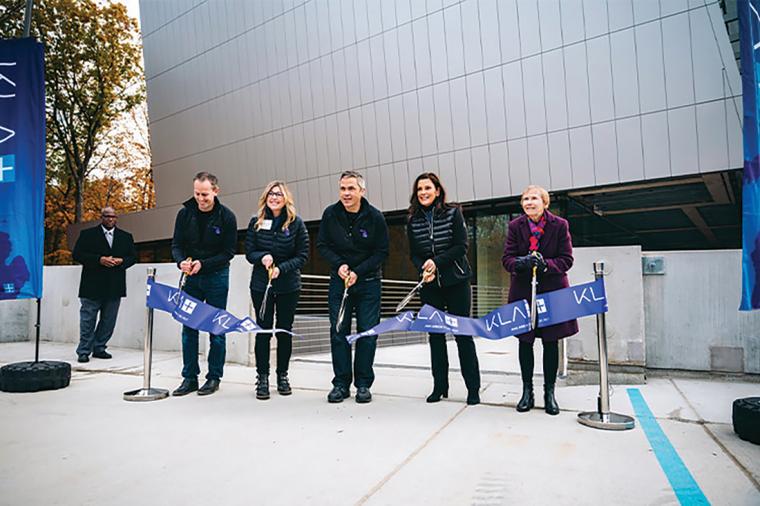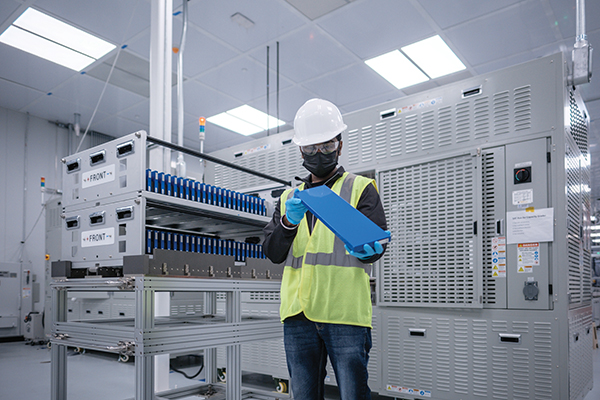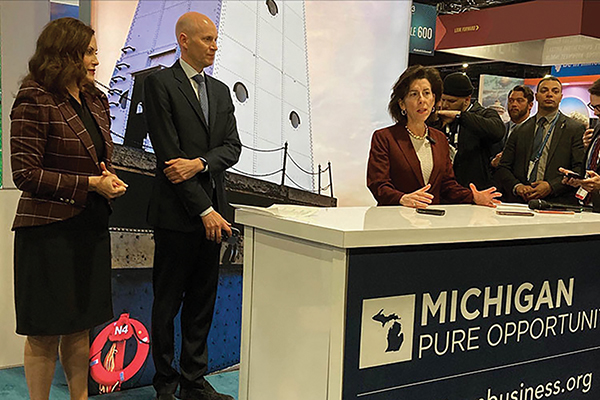
To address the increasing effects of climate change, and with an emphasis on sustainability, Michigan is poised to be a national leader in clean energy advancements and adoption. With Governor Gretchen Whitmerís commitment to carbon neutrality with the MI Healthy Climate Plan and game-changing clean energy bills passed by the stateís legislature, Michigan is laying the foundation for a greener future. In fact, the stateís natural attributes have already helped Michigan be recognized as the best state for climate change preparedness.
Michigan’s clean energy sector, powered by a growing electric vehicle (EV) industry, also leads the Midwest in the number of clean energy workers. In addition to evolving its automotive prowess to include EVs, the state welcomed a series of investments in batteries, semiconductors and even hydrogen in the past year – signaling Michigan is welcoming companies to build their future in the state and help lead the charge for clean energy.
Michigan’s EVolution

Michigan is positioning the U.S. – and particularly, the Midwest – as the center of global EV production through increased manufacturing capacity. With an aggressive strategy driving Michigan’s efforts to secure highly competitive EV projects in particular, the state is being recognized as a force to be reckoned with. In 2022 alone, the state attracted thousands of jobs and $14 billion in EV and battery investments.
That momentum continued into 2023 with additional investments and milestones. From Ford Motor Company’s investment in the company’s first ever LFP EV battery manufacturing facility, the BlueOval Battery Park Michigan in Marshall, to LG Energy Solution (LGES) and Toyota Motor North America partnering to power new EV battery modules out of Holland while investing $3 billion along the way – the state continues to be a hotbed for an electrified mobility future.
Announcements aren’t all that’s driving Michigan’s momentum; the state is also delivering on its commitments as transformational projects continue to come to life across the state.
Consider, for example, that just one year after Michigan-based Our Next Energy (ONE) announced a $1.6 billion investment to build ONE Circle — its first-ever battery manufacturing campus — in Van Buren Township, the cutting-edge battery maker began its pilot production of lithium iron phosphate (LFP) battery cells from the 20 GWh battery factory in November 2023.
“Producing our first cells at ONE Circle is an important milestone for our company to meet our customers’ demand for domestically produced LFP cells for stationary storage and electric vehicles,” said Mujeeb Ijaz, CEO and founder of ONE. “Cells produced at ONE Circle are expected to be fully IRA compliant while eliminating nickel and cobalt, delivering a path toward our vision of a North American supply chain.”
Michigan is attracting EV investments thanks in part to its innovative programs to help train and employ the next generation of talent in the EV and mobility sectors. In March 2023, Michigan kicked off the nation’s largest-ever campaign through its EV/Mobility Talent Action Team to promote careers and recruit talent. Ford, LGES, Toyota and ONE are among the 13 Michigan employers engaged in the public-private partnership alongside public universities and community colleges as part of the state’s recruitment efforts, participating in the state’s Michigander Scholars Program.
Michigan’s impressive track record speaks for itself; it has garnered national attention for the it's undeniable EV leadership. In a report from CNBC, Michigan was named one of three states that are poised to “dominate” EV battery manufacturing in the United States by 2030. Business Facilities named Michigan the number one state in the nation for both EV industry investment and automotive manufacturing, and the state was recognized by Newsweek as the next Silicon Valley for automotive technologies. When these developments are considered together, it couldn't be clearer that Michigan continues to be at the vanguard of a cleaner, greener mobility future.
Setting Sights on Semiconductors

As part of Michigan’s sustainability efforts, the state is also competing for semiconductor investments. Thanks to its supportive business ecosystem and talent solutions, Michigan has become a top state for semiconductor growth.
Michigan’s demonstrated leadership in advanced manufacturing within the semiconductor field is evident in companies with a longstanding presence in the state, such as Hemlock Semiconductor Operations, the largest producer of polysilicon in the U.S., which in 2022 announced plans to further invest at its facilities in Thomas Township.
Additional semiconductor industry companies continuing to invest in the state include semiconductor wafer manufacturer SK Siltron in Bay City, electronic components manufacturer Calumet Electronics in the Upper Peninsula, and Silicon Valley-based corporation KLA, which chose Ann Arbor for its R&D center and new headquarters. Each investment represents a commitment to boosting Michigan’s leadership position in semiconductor manufacturing and development.
“Our partnership with the Michigan Economic Development Corporation has been instrumental in enabling KLA to serve our global customer base from the new headquarters and benefit from the impressive engineering talent and business culture that Michigan offers,” said Rick Wallace, President and CEO of KLA.
Beyond securing competitive investments by industry leaders, Michigan is also aiming to drive the future of this global sector by housing new technologies, discoveries and talent solutions. This includes a new public-private partnership with KLA, Belgium-based technology innovation hub imec, the University of Michigan (U-M), Washtenaw Community College and General Motors to establish the Semiconductor Talent and Automotive Research initiative, a global semiconductor center of excellence in Michigan focusing on developing the talent base and infrastructure necessary to accelerate advanced semiconductor applications for electrification and autonomous mobility.
Building on the success of the EV Talent Action Team, the state launched the Semiconductor Talent Action Team, which works across the public sector, industry partners and training institutions to identify a clear set of semiconductor-specific curricula and R&D investments. In 2023, the MEDC invested more than $3.6 million statewide in grants and matching funds with higher education institutions to promote semiconductor learning and career opportunities. Michigan’s talent initiatives and support are placing the state in a strong position to lead in the semiconductor industry and attract long-term, sustainable investments from companies around the world.
Generation Hydrogen
As the most abundant chemical element, hydrogen is poised to be a green gamechanger, moving Michigan away from fossil fuels in the decades to come. Michigan is teaming up with its neighbors throughout the Midwest to lead in developing a regional supply chain to support the development, production, distribution and use of hydrogen in trucks and heavy-duty vehicles.
In October 2023, Governor Whitmer announced that a Michigan-backed clean hydrogen hub project, the Midwest Alliance for Clean Hydrogen, was awarded up to $1 billion by the U.S. Department of Energy. The project is anticipated to create 13,600 direct jobs and was among only seven to win this transformational funding.
Michigan’s approach to the DOE funding opportunity was informed by a September 2022 report prepared by the U-M’s Center for Sustainable Systems with funding from the MEDC and the university’s Office of the Vice President for Research. “Hydrogen Roadmap for the State of Michigan” served as a high-level assessment intended to help guide planning and future detailed analysis of a Michigan “hydrogen ecosystem” that encompasses production, delivery, storage and end-use applications.
In September 2022, Michigan also announced it would be among seven Midwestern states teaming up to accelerate the development of hydrogen as a clean-energy alternative; the Midwestern Hydrogen Coalition partners Michigan with Illinois, Indiana, Kentucky, Minnesota, Ohio and Wisconsin to collaborate on clean hydrogen development.
Over the past year, Michigan has attracted a series of hydrogen investments throughout the state that will support its commitment to sustainability advancement.
In May 2023, Governor Whitmer announced that Norwegian company Nel Hydrogen would be establishing an automated gigafactory to produce electrolyzer technology for green hydrogen production in Michigan. Nel Hydrogen announced in September that it chose Plymouth Charter Township as the location for the new 507,000-square-foot manufacturing facility.
“From Day One, the Biden Administration has been committed to revitalizing America’s manufacturing industry and combatting climate change by investing in clean energy technologies,” said U.S. Secretary of Commerce Gina Raimondo in May. “[The] announcement at SelectUSA from Nel is helping us fulfill both of those goals and building on Governor Whitmer’s work to make Michigan a leader in clean energy.”
In August, Plastic Omnium New Energies announced plans to establish what is projected to be the country’s largest hydrogen storage manufacturing plant at a facility in Grand Blanc Township, as well as a state-of-the-art testing and validation lab in a yet-to-be-determined location in Michigan to support key aspects of the product’s safety systems.
With the state officially designated as part of a clean energy hub and passing legislation to solidify a commitment toward clean energy, Michigan is positioning itself as not only a sustainability leader, but a pioneer in hydrogen development and adoption.
To learn more about why companies are choosing to Make It in Michigan, visit michiganbusiness.org/pure-opportunity. T&ID

